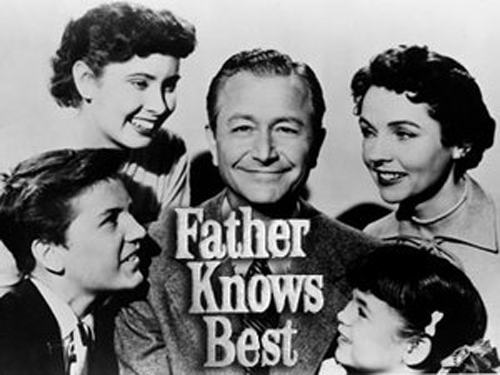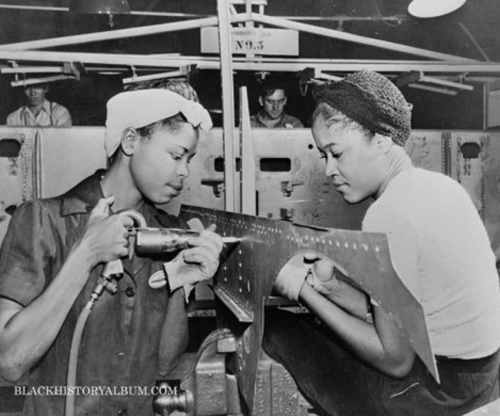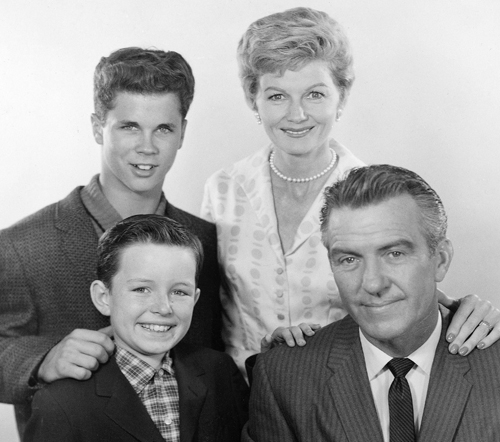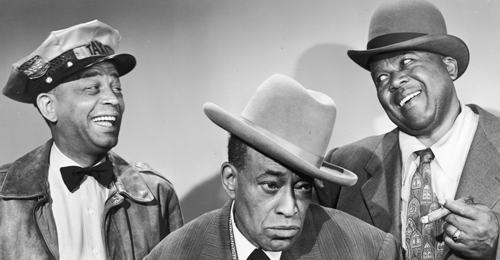MEMORIAL DAY 2015 V: America's version of 'Kinder, K�che, Kirche' sent Rosie the Riveter to the kitchen -- or as a fender slithering model at the Auto Show... Hypocrisies of the propaganda for the so-called 'Greatest Generation' and their legacy of sexism that rivaled the Nazis 'ideal woman'...
Anyone who remembered "Rosie the Riveter" by 1956, when the Edsel was looming and I was ten years old, would have wondered why she was the smiling acolyte of male supremacy we were force fed in TV shows like "Father Knows Best" and "Lave it to Beaver." Just about the only subversive version of a woman's "place" was in "I Love Lucy" -- and it was decades later that we learned to our surprise that sure enough Lucille Ball had been a Commie.
 Dozens of TV shows during the 1950s and 1960s were serious propaganda on behalf of the party line of America's ruling class -- viz., that a woman's "place" was in the kitchen, and NOT in her union, on the picket line, or working at a "Man's Job." Whatever the virtues of the so-called "Greatest Generation," they didn't include a recognition that the equality of women was something that we had to include in the Four Freedoms inscribed on the World War II medals my Mom (who served in the Army Nurse Corps in the Pacific) and my Dad (who was proud of his infantry service in the "ETO") brought home as part of their souvenirs. By now, Memorial Day 2015, it's clear to anyone who has taken a critical look at the ruling class propaganda pushed by Tom Brokaw's polemic "The Greatest Generation" was aimed at denigrating the so-called "Baby Boomers" as a bunch of stoned Hippies who didn't have the courage to fight, suffer and die in the trenches or whatevers of America's wars. In fact, of course, except for a couple of those wars, "America's Wars" were imperialist forays into other peoples' countries that, like Iraq and Afghanistan today, should never have been undertaken in the first place, were "sold" to the American people like soap flakes, and which undermined a great nation's true claims to respect in the world.
Dozens of TV shows during the 1950s and 1960s were serious propaganda on behalf of the party line of America's ruling class -- viz., that a woman's "place" was in the kitchen, and NOT in her union, on the picket line, or working at a "Man's Job." Whatever the virtues of the so-called "Greatest Generation," they didn't include a recognition that the equality of women was something that we had to include in the Four Freedoms inscribed on the World War II medals my Mom (who served in the Army Nurse Corps in the Pacific) and my Dad (who was proud of his infantry service in the "ETO") brought home as part of their souvenirs. By now, Memorial Day 2015, it's clear to anyone who has taken a critical look at the ruling class propaganda pushed by Tom Brokaw's polemic "The Greatest Generation" was aimed at denigrating the so-called "Baby Boomers" as a bunch of stoned Hippies who didn't have the courage to fight, suffer and die in the trenches or whatevers of America's wars. In fact, of course, except for a couple of those wars, "America's Wars" were imperialist forays into other peoples' countries that, like Iraq and Afghanistan today, should never have been undertaken in the first place, were "sold" to the American people like soap flakes, and which undermined a great nation's true claims to respect in the world.
 Just as World War I had won women's right to vote in England and the USA, so World War II should have created a level playing field of high paying industrial jobs for American workers -- both male and female. It took an enormous effort on the part of the ruling class to push most women in the USA back into the kitchen as the "Greatest Generation" returned from the wars.But given the responsibilities that we Baby Boomers (I was born in 1946) had to undertake to destroy the residues of racism, imperialism and sexism that oozed out of World War II's victory parades, it's no wonder that a ruling class pundit who wants us to be ready for the next imperialist war will go out of his way to try and destroy the credibility of those who resisted the imperialist wars that have followed the defeat of Nazi Germany and Imperial Japan in 1945.
Just as World War I had won women's right to vote in England and the USA, so World War II should have created a level playing field of high paying industrial jobs for American workers -- both male and female. It took an enormous effort on the part of the ruling class to push most women in the USA back into the kitchen as the "Greatest Generation" returned from the wars.But given the responsibilities that we Baby Boomers (I was born in 1946) had to undertake to destroy the residues of racism, imperialism and sexism that oozed out of World War II's victory parades, it's no wonder that a ruling class pundit who wants us to be ready for the next imperialist war will go out of his way to try and destroy the credibility of those who resisted the imperialist wars that have followed the defeat of Nazi Germany and Imperial Japan in 1945.
If Lynch Law, rampant sexism, and "Whites Only" Jim Crow are a legacy of a "Greatest Generation," America is in trouble. And when the "Fifties" began, we were...
Most of us growing up during the 1950s did not even recognize the fact that much of popular culture was pushing a dramatic reduction in the opportunities for women. (Later, below, I'll talk about how that era was also dominated by officially sanctioned "Fag Bashing" and other pieces of homophobia that had to be defeated in our battles with the "Greatest Generation").
Television and automobiles were two of the iconic cultural forces of the 1950s. TV was devoted to sexist propaganda, masked as melodramas promoting what might be construed as "family values." Of course, we're talking here about white family values. Throughout the 1950s and into the early 1960s, the portrayals of minorities were slim and usually offense to anyone looking back.
Dozens of TV shows, most now lost to history, portrayed a "typical" nuclear American family. The father wore a suit and tie (even to dinner) and worked in an "office." The mother wore a "housedress" and spent the day at home, raising the family and doing housework, a central job of which was preparing the family meals. Each episode depicted a minor family crisis which could be resolved by the end of a half hour.
"Leave it to Beaver" became an archetype for the white family shows of the era, to the point where in the early 21st Century an African American character (Bubs) in "The Wire" could describe the white part of Baltimore (where a white police officer lived) as "Leave it to Beaver land."
 The typical "American" family during the 1950s was portrayed in the TV series "Leave it to Beaver." The show, which ran from 1957 through 1964, rarely depicted a crisis or problem that couldn't be resolved in a funny but cliched fashion within the 30 minutes' show time.Although some critics have tried to claim that "Leave it to Beaver" had more depth than many other white family shows of the 1950s, the progressive slant of a few "Beaver" episodes as far outweighed by the family structure and visual push from the portrayal of the family itself.
The typical "American" family during the 1950s was portrayed in the TV series "Leave it to Beaver." The show, which ran from 1957 through 1964, rarely depicted a crisis or problem that couldn't be resolved in a funny but cliched fashion within the 30 minutes' show time.Although some critics have tried to claim that "Leave it to Beaver" had more depth than many other white family shows of the 1950s, the progressive slant of a few "Beaver" episodes as far outweighed by the family structure and visual push from the portrayal of the family itself.
What's more, there were in fact dozens of shows that pushed the same version of reality. "The Donna Reed Show" and "Father Knows Best" are among the more typical of those shows. The Rosie the Riveters who had worn dungarees to work and learned the metal trades less than a generation earlier were stuffed into house dresses, rehearsed to maintain eternal bland smiles (except when a minor family crisis required a look of motherly concern), and offered to the growing number of Americans who could afford TVs -- and by the end of the decade, Color TVs -- as the way the world was, is, and should be.
One result of the propaganda of the decade was that the thousands of men and women who returned from their wars with what today would be recognized as post traumatic stress disorders (including my mother, who served as an Army nurse during the most horrific weeks of the "Battle of Okinawa") were basically slandered, ignored, or worse. The men who had served in actual combat and who had experienced the horrors of war first hand could always show up for beers at the local VFW Hall (Veterans of Foreign Wars), which excluded many military "veterans" who had never been out of the USA and who had never seen combat and its horrors. But there was no place for the women, because a woman's place was in a house dress and in her home.
 By the time the "Amos 'n Andy" show reached TV, the characters could no longer be played by white men in blackface talking "black," but the show continued to utilize the minstrel show depictions of black men, while the women were even less respected.One show that began on radio and continued into TV was "Amos 'n Andy." The show, which was originally developed by two white men and done in phony black dialect by them on radio, evolved into a major TV show. In it, anyone wanting to review the racial and sexual stereotypes offered on TV during prime hours can judge for himself or herself. A typical episode is available on You Tube at https://www.youtube.com/watch?v=w1Bsk9GZga8
By the time the "Amos 'n Andy" show reached TV, the characters could no longer be played by white men in blackface talking "black," but the show continued to utilize the minstrel show depictions of black men, while the women were even less respected.One show that began on radio and continued into TV was "Amos 'n Andy." The show, which was originally developed by two white men and done in phony black dialect by them on radio, evolved into a major TV show. In it, anyone wanting to review the racial and sexual stereotypes offered on TV during prime hours can judge for himself or herself. A typical episode is available on You Tube at https://www.youtube.com/watch?v=w1Bsk9GZga8
The depictions of black people on TV were a routine weekly part of the propaganda fed to Americans who could afford TVs during the 1950s and early 1960s.
In the movies, the depictions of black people could be even more disturbing, as the Academy Award Winning 1939 movie version of the racist novel "Gone With The Wind" shows. The slaves in "Gone With The Wind" are happy without any desire for liberation, under the nice ownership of the slave owners. For black actors and especially actresses, there was little alternative than to take those jobs and play those roles. Butterfly McQueen, a Broadway actress with years of experience who played the scatterbrained slave "Prissy" in "Gone With The Wind" later explained to critics that there was very little work for Black actors in general, and even less for black actresses. Among the tragedies of her life was the fact that she was unable to attend the premier of "Gone With The Wind" because it was held in a segregated theater. She died tragically too, burned to death when a kerosine space heater caught her clothes on fire in her tiny home in Augusta Georgia.


By: bob Busch
ma
Glad you had a childhood free of want George.
You were rich even if you didn't know it at the time.You had a mother and father watching your six.My dad died in 1948 when I was less than a year old that meant my brother and I became social Parana's.I wish my mother could have been guilty of all the things you are bitching about.